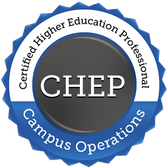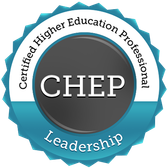Badge Evidence | Completed Courses (4 Hours Each)
ACCSC101Fulfilling the Standards of Accreditation: Administration
This course "pulls back the curtain" for schools to help them better understand the principles and purposes of the ACCSC Standards of Accreditation. ACCSC101, along with the accompanying course ACCSC102, lays out the standards in line with the way schools are typically structured to better help you comprehend the important relationship between each standard and each aspect of running a compliant, accredited school. This course addresses the standards on the administrative side of your school, such as standards that relate to operations, admissions, and financial aid.
ACCSC102Fulfilling the Standards of Accreditation: Academics
This course focuses on the ACCSC Standards of Accreditation which directly tie to the academic areas and program requirements for an accredited school. The course includes information on program development and design, educational policies and procedures, faculty, student services, and educational delivery methods.
ACCSC110Preparing for ACCSC's Essential Workforce Skills Programmatic Certification
Since the inception of career education, it seems employers have consistently claimed that students lack so-called soft skills. Although there's no universal agreement on what to call them, the term represents a set of skills (including things such as teamwork and communication skills) regarded as essential for long-term success in the workforce. ACCSC refers to these types of skills as essential workforce skills.
This course will help institutions adopt a framework for high-quality career education programs, holistically integrate essential workforce skills into their programs, enhance students' development and demonstration of them, and prepare to achieve Essential Workforce Skills (EWS) Programmatic Certification.
CM140Title IX and VAWA Training: Building Safer Campuses
This course is designed to assist personnel at all levels of an educational institution in the understanding of the provisions of Title IX of the Education Amendments of 1972 ("Title IX") as amended on August 1, 2024, and the Clery Act as amended in the Violence Against Women Reauthorization Act of 2013 ("VAWA"). These laws require that all individuals in an educational institution understand and comply with the laws in terms of what is prohibited behavior in relation to sex-based harassment and/or sexual violence, and what steps are to be followed when such prohibited conduct occurs. This course gives the participants information about the laws, as well as procedures to follow, to provide for the rights of all individuals under the laws. It also provides additional resources to assist educational institutions in continuing to build and strengthen their Title IX and VAWA policies, procedures and training throughout the year.
CM141FERPA and Privacy: A Practical Approach
The Family Educational Rights and Privacy Act of 1974 (FERPA or the Buckley Amendment) is a federal law in the United States designed to provide students with access to, and the privacy of, their educational records. The law applies to students in higher education and educational institutions that receive funding under a program administered by the U.S. Department of Education. This course is designed to provide participants with a working knowledge of FERPA guidelines to ensure proper handling of educational records and other institutional requirements.
FA110Developing an Efficient Financial Aid Office
This course provides a blueprint for running an effective financial aid office in an educational institution. You will learn to optimize the performance of your financial aid office with a minimum of waste, expense, and unnecessary effort. The course covers the cornerstones of an efficient financial aid office: timeliness, accuracy and customer service. You will also be advised of pitfalls to avoid in the realm of Title IV compliance. You will learn the key points to building an effective business office processing procedure. Reports and notifications required by the Department of Education are also explained. In addition, you will be given pointers on preparation for the annual Student Financial Aid (SFA) compliance audit and alerted to the most common triggers for Department of Education Program Reviews.
FA120Default Prevention: A State of Mind
This course offers proven-successful techniques that ultimately prevent student loan delinquencies and defaults. Because there is not one miracle that reduces the chance of student loan defaults, this compilation of ideas and practices collectively greatly reduces those risks by giving ownership of the loan responsibilities to the students who benefit from them. By integrating effective borrower education and interaction from the day your students walk through your front door, your students will embrace the state of mind needed to give them lifetime accountability for their Federal Student Loans obligations.
FA210Application Process: Verification, C-Codes and PJ
This course is designed for the financial aid representative who is familiar with the financial aid process, and the campus manager seeking to learn more. The course provides a detailed review of the FAFSA to ISIR/SAR application process, concentrating especially on the technical aspects of the process beyond timeliness and accuracy. The importance of documenting verification and clearing comment codes will be explored, in addition to your role in using professional judgment.
FA230Financial Aid Management - Compliance without Compromise
With a seemingly endless stream of new laws and regulations, institutions have become burdened with ensuring they are compliant, while continuing to give great customer service to their students and families and all while achieving larger institutional goals. The role of the Financial Aid Office in compliance cannot be underestimated, but the Director of Financial Aid cannot ensure compliance in a vacuum.
This course is designed to examine the fundamentals of law and regulation, and of the enforcement process. More importantly, this course provides tools for School Directors, Chief Financial Officers, Enrollment Managers, and Financial Aid staff to develop and build compliant practices that don't interfere with effective operations, customer service or institutional goals.
FA231Regulatory Compliance - Outside the Financial Aid Office
This course will help participants to interpret the many rules and regulations that are required by educational institutions offering Title IV funding. It will aid in preparing management and faculty in recognizing that compliance is the responsibility of the entire institution and is not just the job of the Financial Aid Office. Course content will also aid the individual in building a "culture of compliance" which will encourage teamwork and secure the cooperation of others on campus.
LS101RDo You Manage Or Lead?
This course explores the critical differences between management and leadership. Participants will be introduced to definitions and myths about each area as well as how management and leadership must coexist for an organization to operate effectively. Participants will explore their own management/leadership tendencies through exercises to see leadership and management in action.
LS102How Do You Lead?
Not everyone is suited for, or desires, a leadership position. One of the first steps to being an effective leader is to understand the desire to lead in the first place. Participants will explore their motivation to lead and develop a deeper understanding of their leader style(s).
LS103RYour Leadership Impact
To improve your impact and effectiveness as a leader, you must not only understand the role of a leader, but you must also take into consideration the followers and the situation. This course defines leadership impact and explores the interactional framework for leadership.
LS104RYour Leadership Legacy
The higher education industry provides a wealth of opportunities and challenges for those seeking leadership positions. In this course, participants will gain a deeper understanding of the higher education sector and themselves. The importance of higher education institutions will be explored along with developing a personal leadership legacy.
LS105RYour Leadership Toolkit
Get ready to add a number of skills to your toolkit as you develop as a leader! This course focuses on increased self-awareness in communication styles and learning; developing deeper understanding through empathic listening; and motivating through innovation.
LS106This Way to Leadership
This course provides you with a framework to put your self-discovery and learning into a workable plan to further develop your leadership skills. A step-by-step process is offered to help you create a meaningful Personal Leadership Development Plan (PLDP) complete with the development of SMART Goals and advice from some of today's leaders in the higher education sector.
ML136Stress Management
In this course, you will learn the difference between positive stress that enhances productivity and negative stress that breeds tension, lowers productivity, and undercuts job satisfaction. The course includes strategies for dealing with underlying causes of worry and stress, with tactical advice and coping mechanisms for immediate problem management.
OP115RHiring the Right Faculty for Your Institution
This course shows you how to hire high-quality instructors and orient them to your institution. The skills also apply to hiring staff. It's easy to hire someone to do a job. But it can be difficult to hire the right person. You want instructors who are top notch. They represent your institution and interact with the most people at your campus and particularly your students. This course starts with how to determine exactly what type of people you need as your instructors. Then it shows you how to recruit and hire them. Once hired, you'll learn how to introduce them to the working environment at your institution. By the time you finish this course, you'll be recruiting, hiring, and orienting quality instructors. You'll see results in improved enrollments, student achievement, retention, and completion.
















































